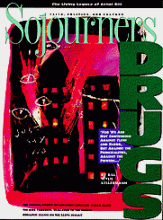The chief of El Salvador's national police stares intently across the table. Though the mere mention of the colonel's name strikes fear into the heart of many a Salvadoran activist, at this particular moment he is looking rather perplexed and unsure of himself. For seated on the other side of the table is Athol Gill, who, having just introduced himself as a Bible professor from Australia, continues to explain that he has traveled from the other side of the globe to find out why the national police have tortured and imprisoned a local Baptist pastor.
The colonel's confidence waxes while announcing that the pastor is a communist, then wanes again as the calm Aussie asks if serving the poor is always a crime in El Salvador. By the end of the hour, the colonel is signing a declaration that the Salvadoran Baptist community will be permitted to continue its ministry with the poor without fear of reprisal.
As incredible as it may seem in view of the final result, only two hours before Athol and I had sat in a hotel room in San Salvador with virtually no idea what we might say to the colonel. We had hopped on a plane and headed directly for El Salvador within days of hearing of the arrest and brutal treatment of the pastor. Yet that was the easy part. Now we were faced with the daunting task of how, with mere wit and moral suasion at our disposal, to battle forces that were armed with arrogance and impunity.
We could only come up with one strategy: Athol would negotiate with the colonel while I would take my time translating messages between them, thus buying Athol precious time to think on his feet. As we then looked at each other nervously, he remarked with a wily smile, "We will make the road as we walk it."
Read the Full Article
